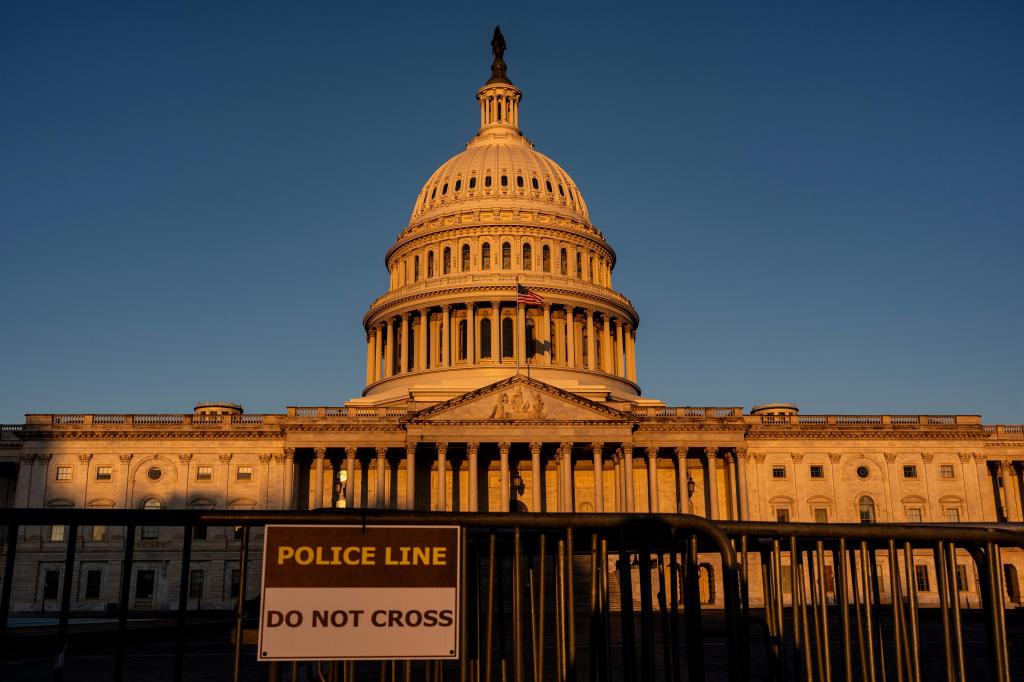As the government shutdown enters its seventh day, discussions among party leaders appear much like the initial days of the crisis. Democrats are advocating for negotiations regarding the expiration of health care subsidies, while Republicans refuse to engage in talks until the government is reopened.
The two parties are presenting starkly contrasting views on the Affordable Care Act (ACA) and the critically needed premium assistance, which is set to expire for millions of individuals. Democrats are pushing for an extension of these benefits, while Republicans argue that the subsidized health care system is fundamentally flawed and needs significant reductions.
Senate Democratic Leader Chuck Schumer articulated Democrats’ stance, stating, “We want the same thing that a majority, an overwhelming majority, of Americans want, which is to end this shutdown and halt the health care crisis that will send premiums spiking for tens of millions of people.”
House Speaker Mike Johnson, R-La., expressed his confidence in his party during a recent meeting with Senate Republicans, declaring that they are “100% united,” reflecting a positive outlook for party unity.
Despite this, the resolution of the impasse remains uncertain. Hundreds of thousands of federal employees continue to be unpaid, and various government services have experienced significant delays or suspensions. Democrats are optimistic that public opinion is on their side as they advocate for maintaining the COVID-era subsidies, but health care remains one of Congress’s most contentious issues. A genuine compromise may prove challenging and could take time to achieve.
There are some Republican members of Congress who support the idea of extending the aid, especially since millions covered by ACA marketplaces will soon receive notifications of premium hikes slated to occur at the start of the year. However, a significant faction within the GOP is staunchly against any extension and views the current debate as an opportunity to attempt comprehensive reforms to the program.
Texas Rep. Chip Roy urged GOP senators in a letter published in The Wall Street Journal to seize the moment, asserting, “If Republicans govern by poll and fail to grab this moment, they will own it.” He cautioned against any wavering on the party’s position, adding, “The jig is up, the pandemic is over and my colleagues shouldn’t blink in any other direction.”
The historical backdrop of the Affordable Care Act reveals a long-standing bipartisan struggle. Since the ACA’s inception 15 years ago, Republicans have persistently criticized it and aimed to dismantle certain elements. Although they have made some incremental changes over the years, they have been unable to significantly alter the law, which now boasts a record 24 million individuals enrolled for coverage largely due to generous subsidies that have enhanced the affordability of insurance plans. Now, the ongoing disputes present Republican leaders and former President Donald Trump with a complex dilemma as they navigate their responses.
Trump took to social media, expressing a willingness to collaborate with Democrats on health care policies but asserted that no discussions could proceed until the government is reopened.
Senate Majority Leader John Thune, R-S.D., noted the possibility of finding a path forward regarding ACA subsidies, contingent upon the White House’s perspective. However, some GOP senators contend that any resolution requires a thorough reworking of the ACA itself. Florida Sen. Rick Scott emphasized, “The whole problem with all of this is Obamacare.”
Johnson indicated that discussions are in progress concerning “pretty dramatic changes” to the ACA that Congress might tackle soon after the government reopens.
Amid the legislative stalemate, the Senate has rejected a House-passed bill designed to extend government funding through mid-November five times, due to Democrats withholding their support unless concessions regarding health care are made.
In this standoff, rank-and-file senators from both parties have engaged in informal discussions to identify potential solutions. Republican Sen. Mike Rounds of South Dakota has proposed a one-year extension of the subsidies, gradually phasing them out thereafter. Additionally, Senate Appropriations Committee Chairwoman Susan Collins, R-Maine, has suggested advancing a set of bipartisan spending bills while guaranteeing talks about health care would follow.
However, many Democrats argue that assurances alone are inadequate, while Republicans insist on deeper reforms—a deadlock that prolongs the shutdown and further complicates negotiations. Maine Sen. Angus King, an Independent aligned with Democrats, stated his willingness to switch his vote against keeping the government open unless Republicans demonstrate real commitment to resolving the health care crisis.
Conversely, Republican Sen. Markwayne Mullin of Oklahoma made it clear that the party remains resolute, stating, “First and foremost, before we can talk about anything, they need to reopen the government.”
Despite this, some Republicans have indicated openness to extending the subsidies, recognizing the impact on their constituents. Missouri Sen. Josh Hawley acknowledged, “I’m willing to consider various reforms, but I think we have to do something,” suggesting that resolution might be urgent, especially with open enrollment beginning on November 1.
Responding to the situation, Rep. Marjorie Taylor Greene, R-Ga., expressed her reluctance towards the ACA but highlighted the growing costs for families, emphasizing, “I’m going to go against everyone on this issue because when the tax credits expire this year my own adult children’s insurance premiums for 2026 are going to DOUBLE.”
As both parties hold firm, the shutdown poses a significant challenge for federal employees, many of whom are left without regular paychecks. Now, the White House is considering the possibility of not providing back pay if the government reopens.
A 2019 law mandates back pay for federal workers during funding lapses. However, a White House memo could shift this policy, inciting further urgency for Democrats to act. Johnson remarked that if the White House proposal is accurate, it should increase pressure for prompt resolution.
In opposition, Democrats contend that federal workers, including those on furlough, are entitled to back pay following a shutdown, with Sen. Patty Murray, a leading Democrat on the Senate Appropriations Committee, emphasizing their rights.
Additionally, the White House announced it would utilize tariff revenue to support the Special Supplemental Nutrition Program for Women, Infants and Children, which faces funding constraints due to the shutdown. Press secretary Karoline Leavitt noted that Trump has devised a “creative solution” to redirect funds from tariffs imposed on international traders, though specifics remain unclear.
This evolving situation illustrates the complexities of navigating a government shutdown while seeking clarity on essential health care solutions amidst persistent negotiations.






